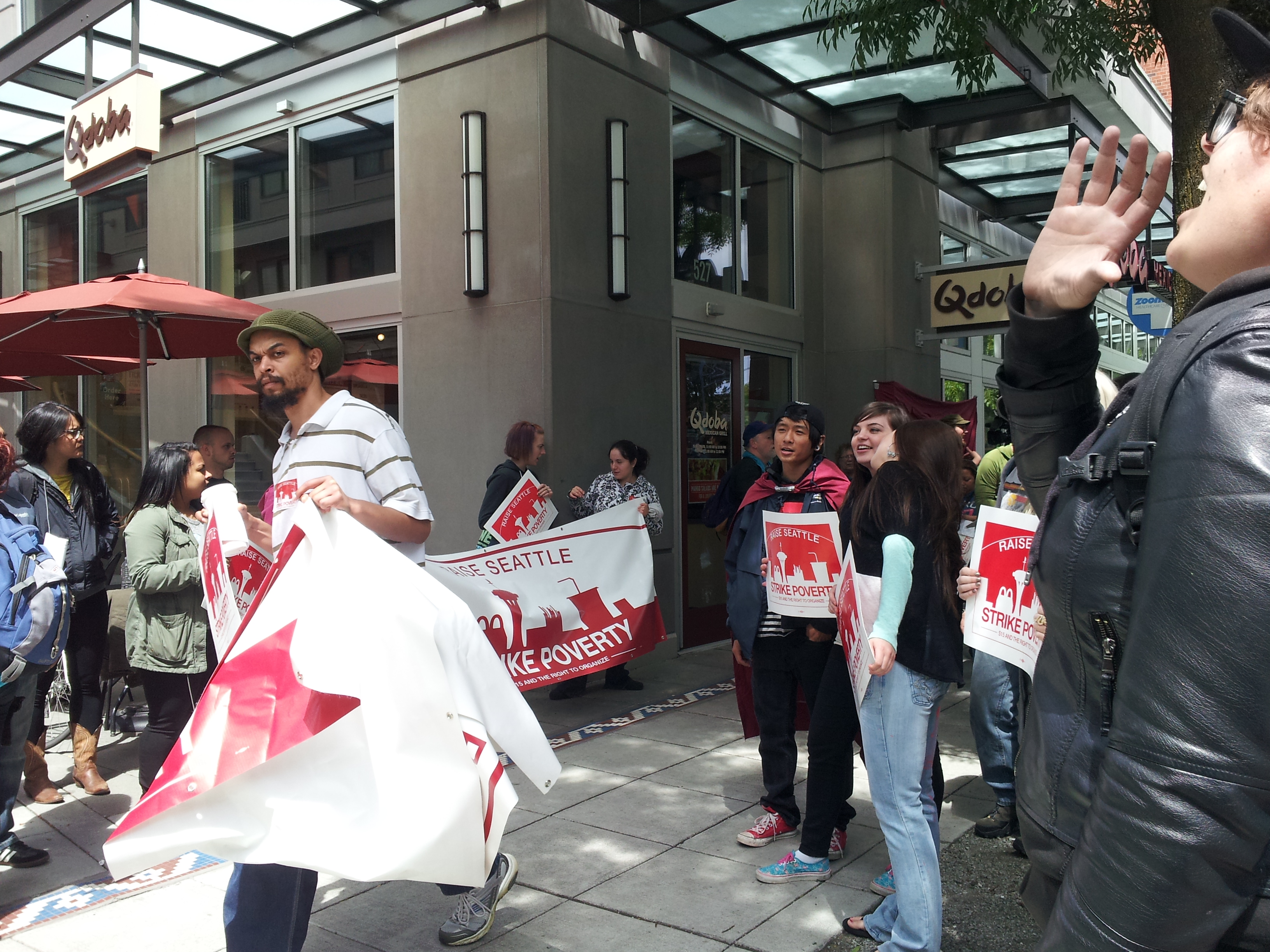It’s been known for some time that the mayoral primary, which will come to a merciful end on Tuesday, was going to be a battle. Unforeseen, though, was what would become the hottest issue on the campaign trail: wages.
Yet the fate of Mayor Mike McGinn’s political career—marked and pockmarked as it is by fights over police accountability, public transportation, and rapid urban growth—may come down to his opinion about an alley.
To be exact, he’s recommended the city not transfer a West Seattle alley to developers who want to build a shopping center anchored by a Whole Foods, reasoning that Whole Foods needs to increase wages and benefits before the city lends it a hand. Leading candidates vying for McGinn’s quickly (if hypocritically) attacked the position. The debate has gone five-alarm, capping a race heavy with labor politics.
But whatever your position in the argument over livable wages in Seattle, the latest hubbub reeks of politics—and not much more. For the low-wage workers at the center of the debate, it’s an unfortunate truth that’s been a common refrain this summer.
While McGinn’s alley stance has gotten the biggest response, the debate over livable wages in Seattle didn’t start in the West Seattle Triangle. In May, fast-food workers throughout the city hit the picket lines for a day, calling for a raise to $15 an hour. Political heavyweights, including McGinn, Ed Murray, and Peter Steinbrueck, signaled support for the striking workers, though none came out in favor of a $15-an-hour minimum wage. Instead, the candidates rallied behind the far more vague idea of a “living wage”—whatever that means.
Two months later, no ordinance has been introduced in Seattle to raise the minimum wage.
Faced with criticism that the mayor had overreached with his Whole Foods stance, his defenders quickly pointed out that it was only a recommendation, with no actual teeth that could be construed as an abuse of power (the City Council ultimately gets to decide the alley’s fate).
Be it politics or policy, the McGinn campaign appears to be embracing the debate, saying it’s been a long-simmering, if not headline-grabbing, issue in Seattle. “This has been an issue that people have been talking about in the last few years as wages have been driven down,” offers McGinn campaign spokesperson John Wyble. “You can tell from the low-wage forum that all the candidates—except [Charlie] Staadecker—feel strongly that we need to address this in some way. McGinn looked at the West Seattle situation and thought we needed to start the conversation about a new approach. He doesn’t believe that we should pay our grocery workers so little that they can’t live in the same city they work in.
“At one point a month earlier, Ed Murray thought that was a good approach,” Wyble continues. “Then he abruptly changed and attacked the mayor. Peter Steinbrueck was vitriolic about the need to do something about low-wage work in the [low-wage] forum, but decided it was better to try to score political points than work on the problem. The mayor sees this as the first step in a discussion about low-wage work in our city. We haven’t seen a city minimum wage put forward, but I think the mayor would be interested in looking at that as one of the options on the table, so that people who work in our city can also afford to live in it.”
The battle lines have been drawn in a debate that so far is much more talk than substance. Sure, the issue is being discussed, but nothing real has materialized; it’s all political posturing, with local business and, especially, low-wage workers caught in the middle.
“I think the lip service that corporate politicians, including the mayoral candidates, are paying to the issue of a living wage has everything to do with the fact that it is an election year, and voters care about this issue,” says Socialist city-council candidate Kshama Sawant, who has come out in support of a $15-an-hour minimum wage. “The real question is how much commitment any of them has to fight for a living wage regardless of electoral outcomes.
“It’s important for people to open their eyes and see this is a charade of a really important issue,” she continues. The Seattle Central Community College economics professor calls McGinn’s approach to the Whole Foods debate “brazen” for its pandering, and she reserves even harsher words for the mayor’s challengers.
“It has taken [McGinn] four years and a strong field of primary candidates to notice [the plight of low-wage workers],” Sawant says. “This is clearly co-opting.”
Is there a chance that this alleged co-opting could lead to actual legislation from McGinn? According to mayoral spokesperson Robert Cruickshank, don’t count on it. Despite Wyble’s indication that the mayor would be “ interested in looking at [a city minimum wage] as one of the options on the table,” when queried on the idea, Cruickshank tells Seattle Weekly that “the mayor’s preference is for an increased minimum wage to be resolved at the state level.”
That about sums it up.








